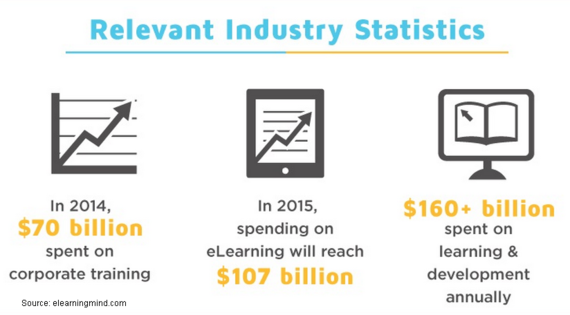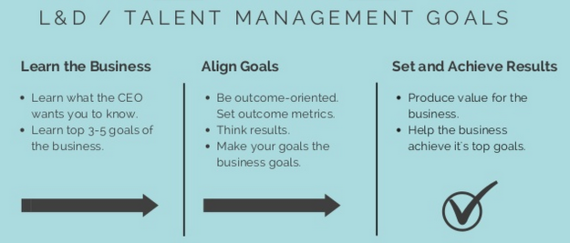
Organizational titles have changed over the years and new ones have emerged like that of Chief Learning Officer (CLO) in response to the challenges and opportunities within the global business environment. With the understanding that learning and professional development is no longer finished the second a person gets a degree or a job, a new role evolved within companies that was charged with the responsibility of nurturing an organization's talent to add new skills and expertise as part of the new knowledge economy, and our culture's now economy.
25 years later, the once enigmatic roll has found its place in forward-thinking companies. The University of Pennsylvania's Executive Doctoral Program now offers the PennCLO program cultivating these future learning leaders.
It is important to look back and reflect on how the role of CLO has evolved and how new technologies are helping CLOs to shape more effective training, learning and development programs.
The Birth of CLOs
In 1990, Jack Welch, head of GE, worked with his team to devise a position that would put someone in charge of corporate learning and development. Since then, numerous companies around the world have adopted this role and spent over $70 billion on corporate training in 2014 alone, according to ELearningMind.com.
This role has increasingly been recognized as a way to address the shortage in skills and talent in the labor pool, the migration to globalized mindset, and ongoing changes in HR technology and learning tools. As a company ahead of its time, GE realized that putting a strategic thinker and leader in charge of these tasks could generate a competitive advantage. "Organizations are realizing the benefits of corporate learning and professional development, and are willing to invest financial and people resources create a positive environment of employee development," opines Andrew Fayad, CEO of eLearning Mind.
Here's how the CLO has evolved into a broader position that now involves many responsibilities, illustrating just how valuable this role has become to organizations to competing in the 'Now economy.'
- Talent Managers: CLOs have to look at people within the organization in terms of how they are progressing on a professional level and then determine the best strategies to help them advance into other roles within the company. Not only does managing talent help the company become more competitive and achieve strategic goals, but it also works toward talent retention objectives because employees recognize that their employer is investing in their development. Keeping this talent onboard is crucial for today's organizations because there is a battleground out there for what talent is actually available to deliver timely products and services to customers. "It's important that everyone at your company feels that there are constantly opportunities for them to learn and grow in a variety of ways" says Toptal executive Breanden Beneschott, whose company holds frequent tech skill learning sessions around the world. Organizations must also work with recruiting, performance management, employee engagement, and compensation teams within the organization to identify and shape talent.
CLOs and the Technology Revolution
As with all aspects of an organization, the learning and development role now has more technology to achieve these expanded responsibilities. CLOs can now access enterprise-class learning platforms that can be used on a global scale to assist talent at every location. This adds consistency but also personalization where necessary while providing the scalability to continue to adapt the learning platform to changes within the organization.
The technology for CLOs is also designed around new understandings about adult learning processes, including the concept of prescriptive learning and embedded learning. A successful CLO stays updated on the research associated with learning styles in order to determine the best delivery system for knowledge, skills assessment and development, and metrics that measure successful learning strategies for individual talent. Additionally, the CLO needs this technology to accommodate language and cultural differences when an organization has a global workforce where cultural attributes and variances in language impact the learning experience.
CLOs of the Future
Reflecting on the evolution in the CLO role over the past 25 years from training function to change leader and talent manager offers a good picture of where these transformation agents have come from, but the most important vantage point is looking forward into the future at what CLOs may soon become. While the CEO is the visionary, he will begin to share that task with the CLO. Working together, these two leaders can collaborate on what the transformation in the organization will look like while the CLO will then head up the action plan for those changes. As a people-centric plan, this transformation is a step beyond just operational changes; it involves a new mind-set and focus.
"In many ways, as a startup, we have institutionalized the function of a CLO and that's where many companies are going," says Alex Gold, Co-Founder of Buzzstarter, a social media management platform that distributes content. "It's not just about employee happiness; it's also about competitiveness. We encourage teammates to acquire new skills, whether it's writing better or executing marketing campaigns more effectively. When they acquire new skills in a supporting environment, they develop into a true disruptive unfair advantage."
Beyond that, the CLO of the future will turn to technology and leverage innovations within learning software to provide the framework for the transformation and shape the advancement of talent that will then enact that revolutionary change. The CLO will identify those changes that can be developed and then utilize the technological advancements that personalize the learning and development experience to re-skill (retool) the organization for greater competitive advantage.
With this future in mind, the role of CLO is becoming one of the most exciting and satisfying leadership roles in today's organization.
So happy birthday, chief learning officer. Here's to another 25 years.



